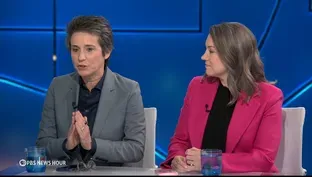
New book 'Personhood' examines reproductive rights battle
Clip: 5/5/2025 | 8m 28sVideo has Closed Captions
New book 'Personhood' examines escalating battle over reproductive rights
After the Supreme Court overturned Roe v. Wade, the victory spurred advocates' pursuit of fetal personhood. That’s legislation that asserts that life begins at fertilization and establishes constitutional protections for embryos and fetuses. Amna Nawaz discussed this latest frontier of the anti-abortion movement with Mary Ziegler, author of “Personhood: The New Civil War over Reproduction.”
Problems with Closed Captions? Closed Captioning Feedback
Problems with Closed Captions? Closed Captioning Feedback
Major corporate funding for the PBS News Hour is provided by BDO, BNSF, Consumer Cellular, American Cruise Lines, and Raymond James. Funding for the PBS NewsHour Weekend is provided by...

New book 'Personhood' examines reproductive rights battle
Clip: 5/5/2025 | 8m 28sVideo has Closed Captions
After the Supreme Court overturned Roe v. Wade, the victory spurred advocates' pursuit of fetal personhood. That’s legislation that asserts that life begins at fertilization and establishes constitutional protections for embryos and fetuses. Amna Nawaz discussed this latest frontier of the anti-abortion movement with Mary Ziegler, author of “Personhood: The New Civil War over Reproduction.”
Problems with Closed Captions? Closed Captioning Feedback
How to Watch PBS News Hour
PBS News Hour is available to stream on pbs.org and the free PBS App, available on iPhone, Apple TV, Android TV, Android smartphones, Amazon Fire TV, Amazon Fire Tablet, Roku, Samsung Smart TV, and Vizio.
Providing Support for PBS.org
Learn Moreabout PBS online sponsorshipAMNA NAWAZ: After the Supreme Court overturned the landmark Roe v. Wade decision in 2022, the victory for anti-abortion advocates spurred the pursuit of a long-sought-after goal, fetal personhood.
That term is for legislation that asserts that life begins at fertilization and establishes constitutional protection for embryos and fetuses.
I spoke recently with law professor and historian Mary Ziegler about her new book, "Personhood: The New Civil War Over Reproduction."
Mary Ziegler, welcome back to the "News Hour."
Thanks for joining us.
MARY ZIEGLER, University of California, Davis, School of Law: Thanks for having me.
AMNA NAWAZ: So, in the book, you write that ending the constitutional right to an abortion was just the first step for this movement.
As you write it -- quote -- For the past 50 years, the priority of the anti-abortion movement has been the recognition of fetal rights," a goal, as you write, dates back to the 1960s.
Why is that the case?
What power does this hold?
MARY ZIEGLER: Well, I think the fight for fetal rights was compelling, of course, in practical terms, because ending the right to choose abortion has left us in a country where it's very difficult to enforce abortion bans.
It's also worth emphasizing that people in the anti-abortion movement are not focused solely on abortion.
They're also concerned about in vitro fertilization, about some forms of contraception, even about the way we reason about equality in the United States more broadly.
So the end of Roe v. Wade, I think, for the movement was really just the beginning.
AMNA NAWAZ: And definitions really matter here, because you know that, even within this anti-abortion movement, there's been some inconsistency.
As you write, there are disagreements about what personhood means.
So is there a consensus?
How would you define it?
If there's no consensus, what does that mean for what advocates are pushing for?
MARY ZIEGLER: Well, the common denominator is really a claim that, at the moment of fertilization, there is a separate, whole, unique human being, and that, as a result of this biological status, that person should have constitutional rights.
At the moment in the United States, there's a lot more debate about what it means to enforce that concept of personhood.
In other words, what does it mean to do justice to this fetus or unborn child?
The general consensus in the anti-abortion movement is that it requires, at the moment, some form of criminalization, whether criminalization of the person who performs an abortion, criminalization of people who assist in abortion, maybe criminalization of the disposition of embryos after IVF or even the storage of embryos after IVF.
But there's debate on the margins about almost everything else.
For example, one of the most prominent debates we have seen break out this year even is a debate about whether abortion seekers or women themselves should be punished for abortion.
There are disagreements about IVF too, disagreements about contraceptives too.
So what personhood actually requires in the real world, rather than kind of in more abstract terms being about who has rights, is something that we have seen really come to the fore now that fetal personhood is no longer a distant dream, but something the movement's trying to realize in the shorter term.
AMNA NAWAZ: And you do write about what you call one of the most promising paths of fetal personhood in Alabama.
That's where the state Supreme Court last year ruled that embryos created through in vitro fertilization, or IVF, were considered children.
Right after that ruling, though, state lawmakers jumped in to protect IVF providers because of how unpopular that state Supreme Court ruling was.
What did that whole episode reveal to you about this movement?
MARY ZIEGLER: Yes, I think the episode revealed something that I think personhood proponents have already recognized, which is that the best and most likely route that we're going to see fetal personhood succeed in the United States is through the courts, whether that's the federal courts and the conservative U.S. Supreme Court supermajority or state Supreme Courts like the Alabama Supreme Court.
Even when state Supreme Courts have elections, they tend to be more immune to the will of voters than -- certainly than state legislators or governors would be.
So there's been, I think, more of an effort to direct this question away from voters and to judges, who I think the anti-abortion movement believes will be more easy to persuade.
AMNA NAWAZ: You also write in the book about how the stakes here go well beyond abortion itself.
What did you mean by that?
MARY ZIEGLER: Well, I think there are two ways in which that's true.
One, of course, if an embryo or a fetus is a person, that will obviously have implications for lots of other things.
As we saw with the Alabama Supreme Court decision last year, it would radically -- recognizing an embryo or fetus as a person, if that requires criminalization or sanction, would have pretty considerable impacts on the way in vitro fertilization is practiced, making it much more expensive and less effective.
It would have impacts on, for example, whether stem cell research could continue.
It would also, I think, in a second way have important impacts on how we reason about equality and liberty generally.
So to get to the conclusion that a fetus or embryo is a person, anti-abortion lawyers have encouraged the courts to think differently about how we recognize fundamental rights, what we mean by constitutional equality.
And those kinds of changes would resonate well outside the context of reproduction in general, right?
So this is a mission that's, I think, been pursued in ways that could change how we think of the Constitution in many other ways.
AMNA NAWAZ: There's also some fascinating historical context in the book.
You write about how the early fetal personhood movement aligned itself with civil rights movements and how there was a group called Students for Life that actually held what they called a Black Preborn Lives Matter rally during the anti-racism protest after George Floyd's murder.
Has fetal personhood always been more of a conservative sort of cause?
MARY ZIEGLER: Well, not entirely, right?
So the anti-abortion movement has always been a big, complicated movement.
And particularly in the 1960s and '70s, really before Ronald Reagan ran for president, it wouldn't have been coherent to really describe the anti-abortion movement as purely conservative across the board.
Of course, most people in the anti-abortion movement had held conservative positions on social issues, not least abortion, but also including other issues related to it, like contraception or gay rights.
But the movement was much more politically diverse on a wide range of other issues.
Part of what we have seen in the United States is a transformation of the anti-abortion movement really since the 1980s.
And I think a closer and closer partnership between the GOP and the anti-abortion movement, between the anti-abortion movement and certain churches, and all of that I think has changed what abortion opponents often mean when they speak about personhood or at least created more fractures within the movement about that, that we see kind of coming to the fore now that Roe is gone.
AMNA NAWAZ: And, Mary, when you look at where we are today, in the years since Roe was overturned, and the numbers, as we track them, abortions have actually been steadily increasing.
And that's despite the fact that some dozen states or so have near-total bans.
So how does that happen?
MARY ZIEGLER: Well, I think it's very -- it's much easier to pass an abortion ban than to enforce an abortion ban, particularly in a country where states in other parts of the country offer legal abortion and where pills and people can travel across state lines.
So I think that's part of the reason we're still seeing so much pressure on the Trump administration to change the rules governing, for example, the abortion pill mifepristone or to enforce an old law called the Comstock Act as an abortion ban, or even to get some kind of federal judicial decision that could be used to crack down, because, as long as this remains a decision at the state level, there are going to be ways to circumvent bans for some people, and people who are committed enough to terminating a pregnancy will often find them.
AMNA NAWAZ: That is Mary Ziegler of U.C.
Davis, author of the new book "Personhood: The New Civil War Over Reproduction."
Mary, thank you so much.
Good to speak with you.
MARY ZIEGLER: Thanks for having me.
AMNA NAWAZ: And a late-breaking development on this topic tonight.
For the first time since President Trump reentered the White House, his administration asked a federal court to dismiss or move a lawsuit that seeks to roll back access to the common abortion drug mifepristone.
While not taking a position on the merits of the case or the drug itself, Trump's Department of Justice says the three states pursuing the lawsuit in a Texas court lack standing.
That is the same position the Biden administration argued.
The implications of Israel's plan to expand Gaza operations
Video has Closed Captions
Clip: 5/5/2025 | 9m 52s | The implications of Israel's plan to expand military operations in Gaza (9m 52s)
Jury selection begins for Diddy’s sex trafficking trial
Video has Closed Captions
Clip: 5/5/2025 | 4m 45s | What happened in the courtroom as jury selection begins for Diddy’s sex trafficking trial (4m 45s)
News Wrap: Hundreds of flights canceled or delayed at Newark
Video has Closed Captions
Clip: 5/5/2025 | 5m 46s | News Wrap: Hundreds of flights canceled or delayed at Newark airport (5m 46s)
Sierra Hull on her journey to becoming a mandolin virtuoso
Video has Closed Captions
Clip: 5/5/2025 | 6m 35s | Sierra Hull reflects on her journey to becoming a mandolin virtuoso (6m 35s)
Tamara Keith and Amy Walter on voters and the economy
Video has Closed Captions
Clip: 5/5/2025 | 7m 26s | Tamara Keith and Amy Walter on who voters believe is responsible for the current economy (7m 26s)
What the Constitution says about due process for noncitizens
Video has Closed Captions
Clip: 5/5/2025 | 9m 13s | What the Constitution says about noncitizens' rights as Trump doubts need for due process (9m 13s)
Providing Support for PBS.org
Learn Moreabout PBS online sponsorshipSupport for PBS provided by:
Major corporate funding for the PBS News Hour is provided by BDO, BNSF, Consumer Cellular, American Cruise Lines, and Raymond James. Funding for the PBS NewsHour Weekend is provided by...

















